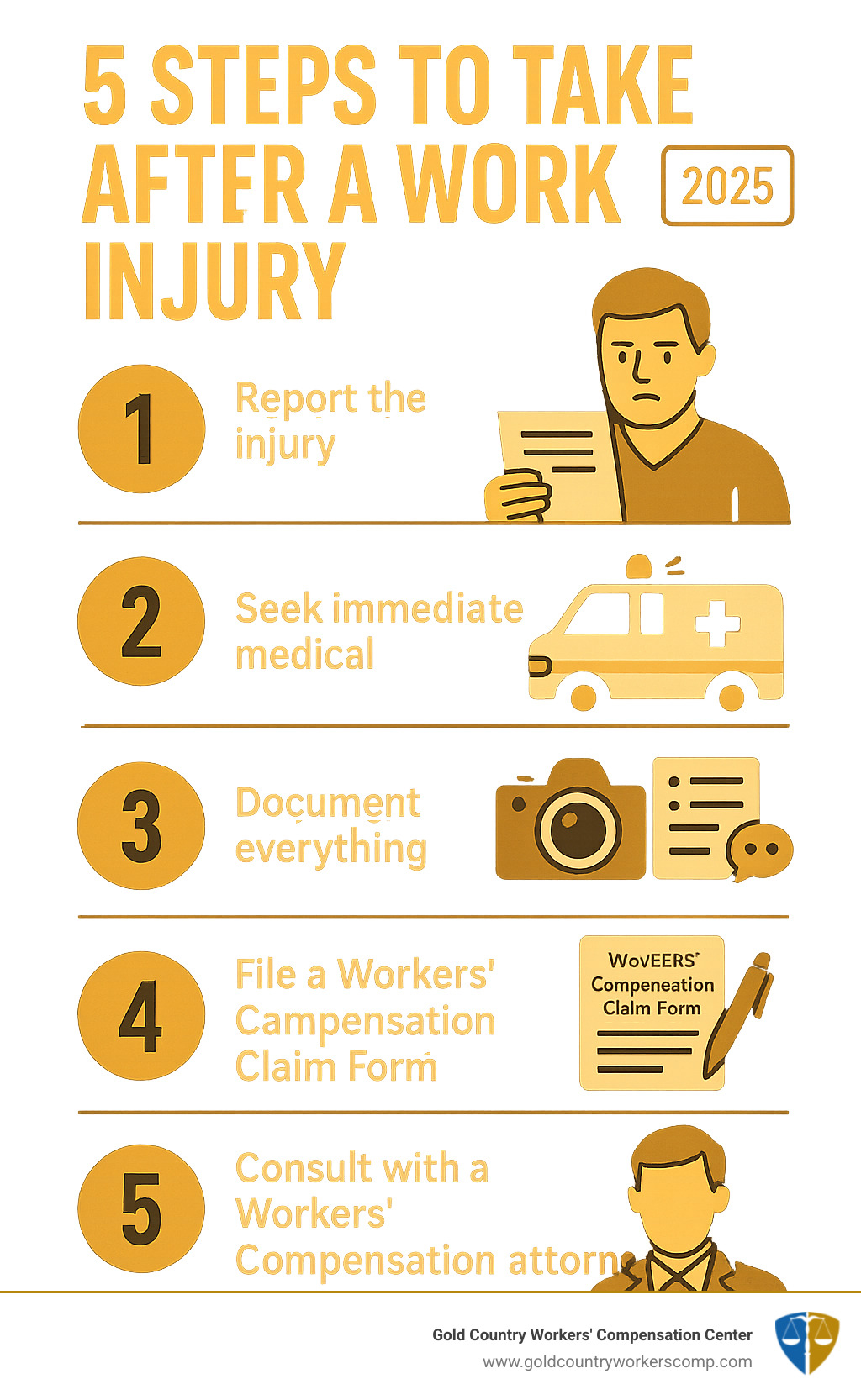Finding the Right Workers’ Compensation Law Firm
When you’ve been hurt at work, finding the right Workers compensation law firm can feel overwhelming. You need expert help to steer the complex system and protect your future. Here’s what to look for in a top firm:
- Specialized Expertise: Look for attorneys who are Board-Certified Specialists in workers’ compensation law. This shows deep knowledge of the field.
- Proven Experience: A firm with decades of combined experience means they’ve handled many cases like yours. Some firms have nearly 100 years of combined experience.
- Client Success Record: Check their track record of significant settlements and high success rates. Many firms boast recovering millions for injured clients.
- No Upfront Cost: Reputable firms work on a contingency fee basis. This means you pay no fees unless they win your case.
- Client-Focused Support: A good firm treats you like family. They should offer dedicated teams, clear communication, and bilingual support if needed.
A workplace injury can turn your life upside down. You face lost wages, medical bills, and confusing paperwork. The California workers’ compensation system, in particular, has many rules and deadlines. You don’t have to go through it alone. This guide is here to simplify your search, helping you find the legal partner you need to secure your benefits and peace of mind.

What is Workers’ Compensation and What Does It Cover?

Think of workers’ compensation as your safety net when things go wrong at work. It’s a state-mandated insurance program that steps in when you get hurt or sick because of your job. The beauty of this system? It’s no-fault, which means it doesn’t matter if you made a mistake, your boss was careless, or a coworker caused the accident. If you’re injured at work, you’re covered.
This system exists to protect you financially when you can’t work and need medical care. Without it, a simple workplace injury could devastate your family’s finances.
Medical benefits are the cornerstone of workers’ compensation. Every reasonable and necessary medical treatment related to your work injury gets covered. This includes doctor visits, hospital stays, surgeries, prescription medications, physical therapy, and even chiropractic care. You won’t be stuck choosing between getting better and paying your bills.
When your injury keeps you from working, wage replacement benefits kick in. You’ll receive about two-thirds of your average weekly wage through what’s called temporary disability benefits. These payments continue while you’re recovering and unable to work.
If your injury leaves lasting effects, permanent disability benefits provide compensation for the long-term impact on your earning capacity. Sometimes injuries change everything, and the system recognizes that reality.
Vocational rehabilitation becomes crucial when you can’t return to your old job. This benefit covers job retraining, resume help, and job placement services to get you back on your feet in a new career.
In the heartbreaking case of a work-related death, death benefits provide financial support to surviving family members, including funeral costs and ongoing support for spouses and children.
Understanding all these benefits can feel overwhelming. That’s why we’ve created a detailed resource on Understanding Workers Comp Benefits to guide you through every aspect.
Common covered injuries include slip and falls, repetitive stress injuries, machine-related accidents, and occupational illnesses that develop over time.
Types of Injuries and Illnesses Covered
Workplace injuries come in many forms, and workers’ compensation covers more than you might expect.
Acute injuries happen in an instant – a fall from a ladder, a cut from machinery, or being struck by falling objects. These sudden, dramatic injuries are what most people think of when they hear “workplace accident.”
Repetitive motion injuries develop slowly over months or years. Carpal tunnel syndrome from constant typing, back strain from repeated lifting, or shoulder problems from overhead work all fall into this category. These injuries can be just as debilitating as sudden accidents, even though they sneak up on you.
Occupational diseases result from workplace exposure to harmful substances. Respiratory problems from chemical fumes, skin conditions from irritating materials, or even certain cancers linked to workplace toxins are covered. These conditions might not show up until years after exposure.
Psychological trauma from severe workplace incidents or chronic job-related stress can also qualify for benefits. When work conditions cause depression, anxiety, or PTSD, the workers’ compensation system may provide coverage.
Secondary injuries add insult to injury – literally. When you favor one side of your body due to an initial injury, you might develop new problems elsewhere. Using crutches could strain your shoulders, or changing how you walk might cause hip pain. These related injuries are also compensable.
Toxic exposure cases often involve long-term health effects from chemicals, asbestos, or other dangerous materials encountered at work.
For comprehensive information about injury types and compensation, visit our page on Workers Comp Injury and Compensation.
What to Do Immediately After a Workplace Injury
The minutes and hours after a workplace injury are crucial. Taking the right steps protects your health and your legal rights.
Report the injury to your employer immediately, and follow up with written notice. California law, specifically Section 5400 of the California Labor Code, requires you to notify your employer within 30 days of the injury or when you first realize it’s work-related. Even if you mention it verbally to your supervisor, always provide written documentation. This written notice proves you met this critical deadline.
Seek medical treatment right away, even if the injury seems minor. Don’t worry about who’s paying – that’s your employer’s responsibility once you file your claim. If your employer doesn’t immediately acknowledge your injury or arrange medical care, get treatment anyway. Your health comes first, and a Workers compensation law firm can sort out the details later.
Document everything you can remember about the incident. Write down the date, time, and exact location where you were injured. Record what you were doing and how the injury happened. Get names and contact information from any witnesses. Take photos of the accident scene, your injuries, and any dangerous conditions that contributed to the incident.
Keep a detailed log of your symptoms, medical appointments, and medications. Save copies of all medical reports, bills, and any communications with your employer or their insurance company. This documentation becomes invaluable if disputes arise later.
File a claim form (DWC-1) as soon as possible. Your employer must provide this form within one working day after you report your injury. Fill it out accurately and completely, then return it to your employer. This form officially starts your workers’ compensation claim process.
These immediate steps create the foundation for a successful claim. For a complete step-by-step guide, check out How to Make a Workers Comp Claim in California.
Why You Need an Expert Workers Compensation Law Firm

“Do I really need a lawyer for my workers’ comp claim?” It’s one of the most common questions we hear, and honestly, it’s a smart thing to ask. After all, workers’ compensation is supposed to be a “no-fault” system designed to help injured workers. So why can’t you just handle it yourself?
Here’s the reality: while the system was created to help you, it’s become incredibly complicated over the years. Think of it like trying to assemble furniture with instructions written in a foreign language – technically possible, but why put yourself through that stress when you’re already dealing with an injury?
Navigating the maze of complexity is where most people get lost. The California workers’ compensation system has layers upon layers of rules, specific forms that must be filled out perfectly, and deadlines that can’t be missed. One small mistake or missed deadline can derail your entire claim. An experienced Workers compensation law firm knows these rules like the back of their hand and can guide you through each step without the guesswork.
Fighting back against claim denials is another crucial reason you need professional help. Insurance companies aren’t in the business of giving money away – they’re looking for reasons to deny or minimize your claim. They might say your injury was pre-existing, that it didn’t happen at work, or that you don’t need the treatment your doctor recommended. When you’re dealing with pain and trying to recover, the last thing you need is to battle a team of insurance professionals who do this for a living.
Maximizing your benefits is something most people don’t realize they need help with until it’s too late. Insurance companies often make quick, low-ball settlement offers to injured workers who don’t know better. They’re counting on you not knowing what you’re truly entitled to. A skilled attorney will make sure you receive every benefit available to you, from complete medical coverage to proper wage replacement and future care needs.
Insurance company tactics can be surprisingly aggressive. Adjusters might call you repeatedly, asking leading questions designed to get you to say something that hurts your case. They might pressure you to return to work before you’re medically ready, or try to get you to accept an inadequate settlement. Having legal representation means these conversations go through your attorney instead of directly to you.
Most importantly, hiring a Workers compensation law firm gives you peace of mind during one of the most stressful times in your life. When you’re injured, your energy should go toward healing, not wrestling with paperwork and insurance companies. Professional legal help lets you focus on getting better while someone else handles the legal complexities.
For more detailed insights into the value of professional representation, visit our page on Why Hire a Workers Compensation Attorney?.
The difference between handling a claim alone versus working with experienced attorneys is dramatic:
| Handling a Claim Alone | With a Workers Compensation Law Firm |
|---|---|
| You’re learning as you go, making mistakes along the way | Decades of experience guide every decision |
| Insurance companies see you as an easy target | They know they’re dealing with professionals who won’t back down |
| You might miss deadlines or file incorrect paperwork | All deadlines met, all forms filed correctly |
| You accept whatever settlement they offer | Every settlement is negotiated for maximum value |
| You’re on your own if complications arise | Expert support through every challenge |
Services Offered by a Top Workers Compensation Law Firm
When you work with a professional Workers compensation law firm, you’re getting much more than just someone to fill out paperwork. You’re getting a complete support system designed to handle every aspect of your case.
Case evaluation is where it all starts. A good firm will sit down with you and carefully review every detail of your injury and situation. They’ll look at your medical records, understand how the injury happened, and assess the full scope of what you’re dealing with. This isn’t a quick five-minute conversation – it’s a thorough analysis that sets the foundation for your entire case.
Filing paperwork might sound simple, but there’s an art to it. Every form needs to be completed accurately, every deadline must be met, and every piece of documentation needs to be submitted properly. Your attorney handles all of this, ensuring nothing falls through the cracks.
Gathering evidence is crucial for building a strong case. This means collecting medical records, getting witness statements, documenting the accident scene, and building a comprehensive picture of how your injury occurred and how it’s affecting your life. Your legal team knows exactly what evidence will be most persuasive and how to obtain it properly.
Negotiating settlements is where experience really pays off. Insurance companies make their living by paying out as little as possible. Your attorney knows the true value of your case and won’t let you settle for less than you deserve. They understand the negotiation process and have the skills to push back when offers are inadequate.
Representing you at hearings becomes necessary if your case goes before a workers’ compensation judge. This is technical, legal territory where having professional representation isn’t just helpful – it’s essential. Your attorney will present your case effectively and advocate for your rights in front of the judge.
Managing appeals is unfortunately sometimes necessary when initial decisions don’t go your way. The appeals process has its own set of rules and procedures, and having someone who understands this system can make the difference between success and failure.
Third-party claims are an often-overlooked opportunity for additional compensation. If someone other than your employer contributed to your injury, you might have a separate legal claim against them. Your attorney will identify these opportunities and pursue them on your behalf.
If you’re wondering whether professional help is right for your situation, consider scheduling a Free Workers Comp Case Consultation to discuss your specific circumstances with no obligation.
How Much Does a Workers Compensation Law Firm Cost?
One of the biggest concerns people have about hiring an attorney is cost. The good news is that workers’ compensation attorneys work differently than most other lawyers – they work on a contingency fee basis.
No upfront costs means you don’t pay anything to get started. There are no consultation fees, no retainer fees, and no hourly charges. This removes the financial barrier that might otherwise prevent you from getting the help you need when you’re already dealing with lost wages and medical bills.
Percentage of settlement is how attorneys get paid in workers’ compensation cases. Instead of charging you by the hour, they take a percentage of whatever they recover for you. This means they only get paid if they win your case – their success is directly tied to your success.
California fee regulations keep attorney fees reasonable and fair. The state regulates how much attorneys can charge for workers’ compensation cases, ensuring you’re not taken advantage of during a vulnerable time.
No fee unless you win is the bottom line. If your attorney doesn’t recover benefits for you, you don’t owe them anything. This arrangement gives you access to professional legal help without financial risk.
Cost-effective representation often pays for itself many times over. The difference between what you might recover on your own versus what an experienced attorney can recover for you typically far exceeds the attorney’s fee. You end up with more money in your pocket, even after paying legal fees.
This fee structure makes professional legal help accessible to everyone, regardless of their financial situation. You get experienced representation without having to worry about how you’ll pay for it upfront.









